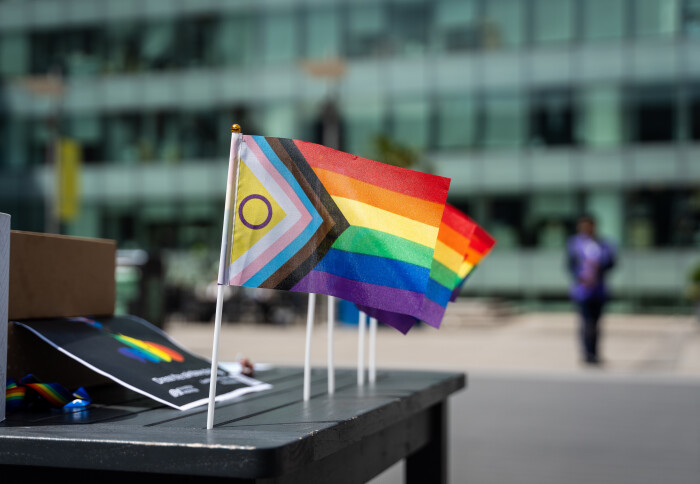Imperial recognised as an LGBTQIA+ inclusive employer
by Sara West

Imperial has been recognised by Stonewall for its ongoing commitment to inclusion for LGBTQIA+ individuals in the workplace.
Imperial has placed 33 out of 246 organisations in the Stonewall Workplace Equality Index (WEI), securing a place on Stonewall’s Top 100 Employers 2024 list. Participation in the index is voluntary and submissions are marked against thorough and standardised criteria. The Top 100 Employers are selected by Stonewall for their excellent work in creating inclusive environments for the LGBTQIA+ staff.
Provost Professor Ian Walmsley said:
“Imperial is committed to creating a culture where LGBTQIA+ individuals feel welcome, included, and fully able to be themselves. Our ambition for all staff and students is that we have an environment that enables everyone to thrive and do their best work.
“I would like to thank all our colleagues who have committed their efforts to the range of activities and initiatives which have contributed to this recognition.”
Training, mentoring and support
Colleagues across Imperial have dedicated their time to delivering training and initiatives which support Imperial’s ambition to make sure its community is a diverse environment where people and ideas can thrive.
The initiatives that contributed to Imperial’s recognition in the Stonewall index include increased training for staff on LGBTQ+ inclusion and mental health, the development of a range of tools and resources for all staff, and The continuation and expansion of the Reverse Mentoring scheme, which includes LGBTQIA+ mentors, to more leadership figures. The experiences of LGBTQIA+ have also been shared through campaigns such as Behind the Lens at Imperial, Imperial People profiles, and LGBTQ+ Brains.
A range of support and resources for staff are available through the Equality, Diversity and Inclusion Centre (EDIC), and through resources including Confidential Care and Imperial’s Report and Support scheme.
Staff networks and community events
Imperial 600, the network for LGBTQIA+ staff, postgraduates and allies, have been central to increasing the visibility of LGBTQIA+ rights and experiences in the workplace. They were awarded the President’s Award for Excellence in Culture and Community in 2023 for their achievements in raising awareness and running a range of intersectional community events. These have included book club sessions featuring works by diverse authors, collaboration with Ethos to put on fitness sessions for the LGBTQIA+ community, launching the ally badges, and establishing a “network of networks” to enable better collaboration with local and departmental LGBTQIA+ groups within Imperial.
Associate Provost for Equality, Diversity and Inclusion, Professors Lesley Cohen and Wayne Mitchell, said: “We are pleased Imperial has been recognised for its work on LGBTQIA+ inclusion, and we recognise the ongoing efforts that are needed to continue improving the experience of our community. It is fantastic to reflect on the range of initiatives taking place at Imperial and we look forward to building on existing provision and good practice.”
LGBTQIA+ inclusion in the workplace
According to Stonewall’s ‘LGBT in Britain – Work Report’, more than a third of LGBT staff in the UK (35 per cent) have hidden who they are at work for fear of discrimination. This means LGBTQIA+ people often feel that they have limited options when applying for jobs, or that the work culture isn’t for them when they do land a job.
Imperial is a member of Stonewall's Diversity Champions Programme. Through this programme, the university works with Stonewall to better understand how it can ensure LGBTQIA+ staff and students are accepted without exception at the institution.
Find out more about LGBTQIA+ equality at Imperial on the EDIC website. If you are a departmental LGBTQIA+ rep and would like to connect with the rep network, email Imperial 600.
Article text (excluding photos or graphics) © Imperial College London.
Photos and graphics subject to third party copyright used with permission or © Imperial College London.
Reporter
Sara West
Communications Division